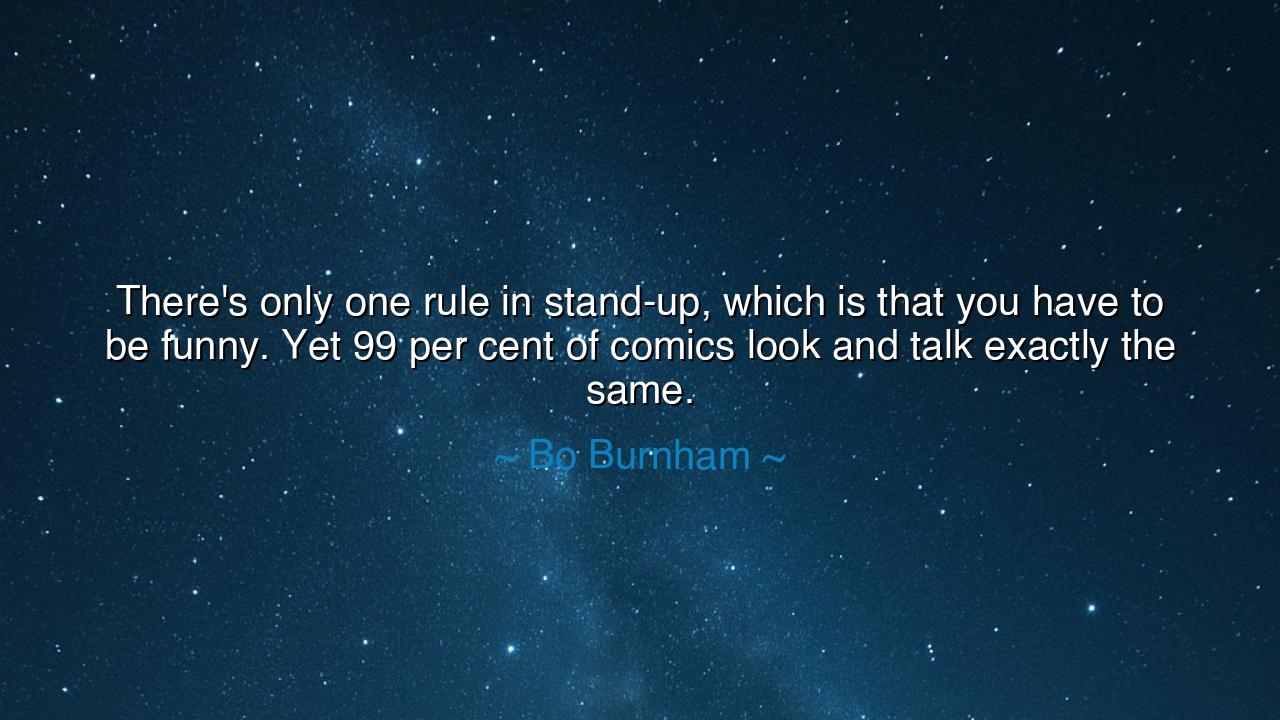
There's only one rule in stand-up, which is that you have to be
There's only one rule in stand-up, which is that you have to be funny. Yet 99 per cent of comics look and talk exactly the same.






In the words of Bo Burnham, “There’s only one rule in stand-up, which is that you have to be funny. Yet 99 per cent of comics look and talk exactly the same.” — we find not merely a critique of comedy, but a lament for authenticity, a call for individuality in a world that rewards imitation. Beneath his wit and irony, Burnham speaks a truth that transcends the stage: that true art, true voice, is born not from conformity but from courage — the courage to be different, to be oneself, even when the crowd demands sameness. His words are not only about comedians, but about every soul who fears to stand apart in a world that worships the familiar.
The meaning of this quote lies in its paradox: though the purpose of comedy is freedom — freedom to laugh, to question, to see beyond — many who enter its realm become bound by invisible chains. They imitate what works, copy what sells, and blend into a chorus of voices that sound alike. Burnham reminds us that the one sacred rule of stand-up — “be funny” — does not mean to follow others’ patterns, but to find humor through one’s own truth. To be funny is not to conform; it is to reveal something genuine, something brave, something that comes from the depths of human experience. When 99 per cent of comics “look and talk exactly the same,” the laughter becomes hollow — a repetition of echoes rather than the music of originality.
In the days of the ancients, such wisdom was known under a different name: authentic expression. The philosopher Diogenes, who lived in a barrel and mocked the pretensions of Athenian society, understood what Burnham means. He did not seek to please the crowd, nor to resemble his peers. Instead, he chose truth in its rawest form — to be himself, even at the cost of ridicule. His actions were absurd, but his message was divine: the soul that imitates others loses its light. Diogenes was, in a way, the first stand-up philosopher — a man who used humor to reveal the hypocrisy of his age. He was “funny,” yes, but also fearless and unique.
The origin of Burnham’s insight comes from his own journey through the modern labyrinth of fame and artifice. Rising to prominence as a digital performer, he entered a world where originality is both celebrated and punished. He saw firsthand how an art form once born from rebellion — stand-up comedy, the voice of the outsider — had become another industry shaped by formulas and expectations. His frustration is not with the comedians themselves, but with the system of sameness that dulls the edges of creativity. In his words, one hears both the sorrow of the artist and the defiance of the philosopher: a yearning to reclaim art as truth, not imitation.
Consider, too, the story of Lenny Bruce, a comic of the mid-20th century who refused to be like the others. While many played safe, Bruce tore through taboos and spoke of what society dared not mention — politics, religion, hypocrisy. He was condemned, imprisoned, and ridiculed, yet his legacy endures because he dared to be different. Bruce embodied Burnham’s principle: he was funny because he was true. He understood that comedy, like all art, loses its power when it fears discomfort. It is the courage to offend, to provoke thought, to speak in one’s own voice — that makes laughter meaningful.
The lesson, then, extends beyond the realm of performance. In every field of life, whether art, work, or conversation, the world pressures us to “look and talk the same.” It is easier to mimic than to create; easier to belong than to stand apart. Yet Burnham’s words challenge us to reject this comfort. For what is funny, what is beautiful, what is powerful, comes only from authenticity. To be truly alive — not merely existing, not merely pleasing — one must dare to sound different, even if the world does not laugh at first.
Therefore, my friends, heed this wisdom: when you create, speak, or act, let it be your voice that echoes, not the borrowed tones of others. Do not measure yourself against the applause of the crowd, but against the honesty of your soul. For imitation may bring safety, but only originality brings truth. If your humor, your art, or your life stirs something real — even discomfort — then you have succeeded where many have failed. You have honored the only rule that matters: to be real.
And so, in the spirit of Bo Burnham, remember: the purpose of expression — whether through words, laughter, or art — is not to blend in, but to awaken. The world will always have its 99 per cent, the chorus of the predictable, the performers of repetition. But the one who dares to sound unlike them — who speaks with their own rhythm, their own fire — will leave a mark that time itself cannot erase. For in every age, the voice that is true is the one that remains eternal.






AAdministratorAdministrator
Welcome, honored guests. Please leave a comment, we will respond soon